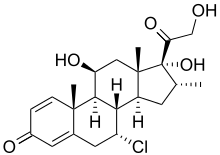Alclometasone
Alclometasone is a synthetic corticosteroid for topical dermatologic use, possessing anti-inflammatory, antipruritic, and vasoconstrictive properties.[2]
 | |
| Clinical data | |
|---|---|
| Trade names | Aclovate |
| AHFS/Drugs.com | Monograph |
| MedlinePlus | a604021 |
| Pregnancy category |
|
| Routes of administration | Topical |
| ATC code | |
| Legal status | |
| Legal status |
|
| Pharmacokinetic data | |
| Bioavailability | 3% systemically (topical) |
| Metabolism | Hepatic |
| Onset of action | Eczema: 5.3 - 13.9 days; Psoriasis: 6.7 - 14.8 days [1] |
| Identifiers | |
| |
| CAS Number | |
| PubChem CID | |
| DrugBank | |
| ChemSpider | |
| UNII | |
| ChEBI | |
| ChEMBL | |
| Chemical and physical data | |
| Formula | C22H29ClO5 |
| Molar mass | 408.92 g·mol−1 |
| 3D model (JSmol) | |
| |
| |
| | |
The prodrug alclometasone dipropionate was originally marketed under the brand name Aclovate by GlaxoSmithKline as a topical cream and ointment. However, generic versions of the drug are available.
Medical uses
Alclometasone cream and ointment are indicated for the relief of corticosteroid-responsive dermatoses, including:
- atopic dermatitis
- eczema
- psoriasis
- allergic dermatitis
- contact dermatitis
- actinic dermatitis
- kiss-type allergy
- skin itch
Alclometasone may be used on sensitive skin sites (face, skinfolds); in pediatric patients 1 year or older and in geriatric patients.
Contraindications
- hypersensitivity to alclometasone or any of ingredients in pharmaceutical forms
- cutaneous tuberculosis
- chicken pox
- perioral dermatitis
- acne
- rosacea
- open wounds
- trophic ulcers
- viral infection of skin
- skin manifestations of syphilis
Side effects
Adverse reactions (sometimes, less than 1-2% cases) include:
- burning
- itching
- erythema
- skin reddening
- xerodermia
- skin irritation
- acne
- hypopigmentation
- prickly heat
- folliculitis
- white atrophy
- hypertrichosis
- reinfection of skin
Pharmacology
Alclometasone induces the production of lipocortins, formally known as annexins, which inhibit phospholipase A2 – the enzyme responsible for the synthesis of arachidonic acid. Without the oxidation of arachidonic acid, eicosanoids, such as prostaglandins, thromboxanes, and leukotrienes, can't be produced.
Alclometasone also inhibits the release of pro-inflammatory mediators from leukocytes (e.g., cytokines, histamine, leukotrienes, serotonin).
Formulations
Alclometasone as Aclovate is supplied in:
- Cream; Topical; 0.05%
- Ointment; Topical; 0.05%
References
- "Alclometasone - Professional Patient Advice". Drugs.com. Retrieved 29 December 2017.
- "Alclometasone - FDA Prescribing Information". Drugs.com. Retrieved 29 December 2017.